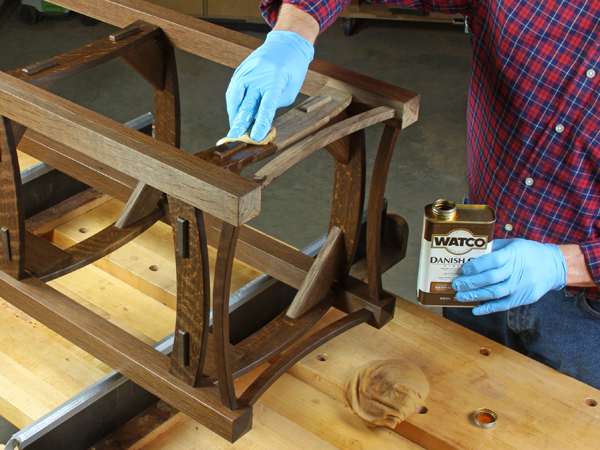
Chris Marshall: Edible oils form a broad category that includes both those we typically cook with (canola, corn, olive, etc.) and those we don’t, such as walnut and mineral oil. Some will turn rancid, while others won’t. I’m not familiar with shea oil or its use as a wood finish (just shea butter that’s often part of hand lotions these days). But think of oils this way: if you can cook with them, they generally will turn rancid under the right conditions.
I want to unpack your question a bit further — and forgive me if I’m assuming more than I should here. If you’re thinking of applying an oil finish to your dining room table, it’s probably because the application process is super easy: flood it on, let it soak into the bare wood and wipe it off. Easy feels doable for woodworkers of any skill level. And, you can replenish an oil finish easily, too, by just wiping on more down the road.
But an “easy” finish isn’t necessarily the right finish. Most oil finishes don’t provide much protection, because they don’t form a durable film on the surface that prevents food and alcohol spills from soaking in and staining the wood. And when it comes to a dining room table, of course, spills of one sort or another are a real concern. You also want a finish that offers durability against scuffs, heat and indentations from the normal wear and tear of use.
Instead of an oil finish, Kate, consider finishing your dining room table with polyurethane. There are other film-forming finishes too, like shellac or lacquer, but polyurethane is much easier to apply successfully. You can spray, brush or even roll it on with a foam roller — I do this often with good results. Urethane finishes form a super-durable film that resists spills, wipes clean and will keep your table looking great for many years. It’s a much better choice than any of the oil finish options. And, there are water-based polys now that are easy to clean up with soap and water and dry super fast. You can apply several coats in one day.
Rob Johnstone: Shea oil (also shea butter) is derived from the fat extracted from the shea nut, found in Africa. Because it is an organic fat, I believe it will become rancid over time. (Although I could find no documentation to corroborate my opinion.) In terms of finish on a dining table, I completely agree with Chris that a more durable finish would be my preference — one that forms a more protective barrier for the wood.
One exception to the rule of thumb Chris provided about oil finishes is products like Watco oil, which is an oil that has additional agents added. Watco is more like a super-runny varnish — and for that reason could be built up to form a durable protective film … if you’ve more patience than Job and not a lot else to do with your time.





